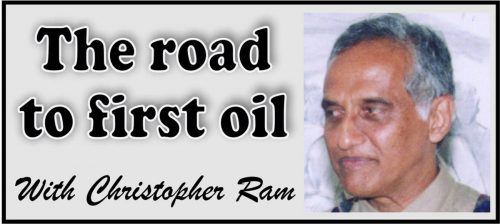On the day this column appeared last week, the press in Guyana, in an outstanding case of enterprising journalism, confirmed that Guyana had indeed received a signing bonus from ExxonMobil. The evidence was out – a letter from the Finance Secretary, a Permanent Secretary equivalent, in the Ministry of Finance to the Governor of the Bank of Guyana with the caption Signing Bonus granted by ExxonMobil – Request to open Bank Account.
But if anyone thought that the trail of obfuscation, deception and outright lies peddled since the fourth quarter of 2016 had come to an end, a new cycle began. First of all, even after the publication of the letter, Government spokespersons did not disclose the sum received which eventually came out of ExxonMobil after its country manager was collared at one of the company’s outreaches.
The saga involved the Ministers of Finance and Natural Resources, the President himself, the Foreign Minister and the Minister of State. Outside of the government, the local anti-corruption body Transparency Institute, Justice Institute of Guyana, the former Auditor General of Guyana and the independent dailies were appalled to find that the APNU+AFC had taken a dangerous road of concealment with ever more outrageous and inane excuses being made by key government spokespersons.
Gone with the truth
In fact, it seemed so bad that it appeared that if the statement of one spokesperson was truthful, then those of others, were not! Indeed, in the case of some of those persons, a statement made one day was often diametrically opposite to a statement made the next. Raphael Trotman, the Minister of Natural Resources and Leader of the AFC was perhaps the most egregious, having first announced that the law prevented him from disclosing anything, a statement he repeated until that excuse was exposed as silly and wrong. Then on March 4, 2017 the mendacious tune shifted to “minor changes made to 1999 agreement with ExxonMobil.” (Stabroek News March 4, 2017). In that report another line was that he thought that “government was of the view that full disclosure would not be to the best of the national benefit or national interest”.
Mr. Trotman was obviously unaware that Telesur, a multi-state left wing, multi-State funded, pan–Latin American terrestrial and satellite television network, headquartered in Caracas, Venezuela, had been on to a story that ExxonMobil had apparently agreed to finance the country’s legal fees which are estimated to be about US$15 million. That report finally came out early this month and before the pattern of deception about the Signature Bonus had been exposed locally.
The Finance Minister, who had earlier denied a signing bonus as a figment of someone’s imagination further dented his reputation following the revelation last week in trying to justify the use of a special account. Incredibly, he posited that “money needed to fund lawyers would be pulled from the special deposit account, transferred to the Consolidated Fund and removed from there once the supplementary budget is passed.” After a number of court cases over the last few years on Lotto Funds, NICIL’s sale of GTT’s shares and state property, almost every reader of the newspapers in Guyana knows that Article 216 of the Constitution and section 38 of the Fiscal Management and Accountability Act require, with very clear and limited exceptions, public moneys to be deposited in the Consolidated Fund. They are also aware that any payment such as fees for lawyers have to be paid out of funds appropriated by the National Assembly.
Non-compliance with these provisions are therefore unconstitutional, erroneous, arbitrary, unreasonable, irrational, unlawful, illegal, and done in bad faith.
The buck but not the questions stops with the President
Soon after, the President returned from another overseas trip, and found himself the subject of serious editorials calling on him to sack the Ministers responsible for these grave violations. It took him five days to respond, referring to National Security Emergency and taking full responsibility for the decision. He was far from convincing and even some supporters saw in that tactic some form of exoneration of his ministers. As a former army man, he must know the principle laid down in the Nuremburg Trial and that his attempt to shield his incompetent ministers with his immunity is a non-starter.
Embarrassingly for the President, when his statement is juxtaposed with that by Trotman reported in the Stabroek News of March 4, someone was not telling the truth. In that statement, Trotman was reported as saying that “he will weigh in and advise President Granger of the myriad reasons [for non-disclosure], including the security of the nation.”
To make matters rather uncomfortable for himself, the President was reported as also stating that he took the decision to place the bonus money in a special account with the Bank of Guyana outside of the Consolidated Fund and that he was “aware that it is in the Bank of Guyana in escrow.” As a former businessman, the President is expected to know that an escrow is an arrangement that involves placing money with a third party to be disbursed on the delivery or satisfaction of some obligation. No matter how it is stretched, the account held at the Bank of Guyana does not meet the definition of an escrow account.
Lawyers Feast
Mr. Greenidge was further reported as stating yesterday that US$15 million would go towards legal fees and the other US$3 million would go towards urgent training for Guyanese in areas such as petroleum and geology. It may of course be entirely coincidental, but the legal fee provision stated by Greenidge was the same as that quoted in the Telesur report.
Let us turn for one moment on that US$15 million legal fees. I have done a rough survey of the major practices and estimated that the annual legal fees collected by practitioners in Guyana are roughly $500 million, or, about US$2.4 million. In other words, the Government intends to pay out about six times the gross annual earnings of all the practising lawyers in Guyana. Or put another way, these same Guyana lawyers would have to work six years to earn US$15 million.
And what would these foreign geniuses do? They will go back to the papers of the 1899 Arbitral Award, the excellent work done by Guyana diplomat Cedric Grant and Mohammed Shahabuddeen and the consultancy work by Sir Shridath Ramphal. Given their comments over the 2016 contract signed by Trotman and ExxonMobil in 2016, one must wonder whether Trotman, Jordan and Greenidge are really aware of the amount of work that has already been done in relation to the controversy with Venezuela.
Conclusion
Finally, Mr. Anand Goolsarran who had argued for the return to ExxonMobil of the secret bonus, was reported in a subsequent article as pointing the Administration on a way out of the imbroglio by way of the creation of an Extra-budgetary Fund. While such a fund would appear legal under section 39 of the Fiscal Management and Accountability Act, it would seem to be inconsistent with the Constitution which provides only for “one Consolidated Fund.”
Let us do the right thing – put the money in the Consolidated Fund to be expended by way of an Appropriation Act. And by the way, where in all of this is our hardworking Attorney General, the principal legal adviser to the Government of Guyana?










